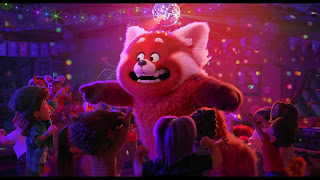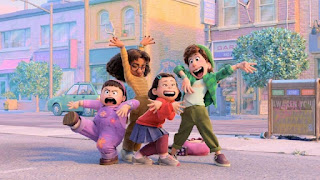Before I saw Disney/Pixar's Turning Red I read that white men were having trouble relating to the film, and my first thought was "Oh poor things, they're just going to have to make do with nearly every movie ever made". After seeing the film, I get why men can't relate to it, and that's not a bad thing.
And of course, spoilers.
The Plot
Turning Red follows Mei, a 13 year old Asian/Canadian living her best life in 2002 when she finds out a family curse will turn her into a giant red panda whenever she feels strong emotions. As her family prepares to perform the ritual to contain her panda, Mei and her friends exploit her new powers to earn enough money for tickets to a boy band concert. Things come to a head when Mei has to decide weather to choose her family and their expectations or her friends and their acceptance.
There's little to no subtlety here: This film is made for teenage girls. The main protagonist is boy crazy, makes cringeworthy art, loves boy bands, and is trying to find her place in the world as she transitions to adulthood. We even have a Twilight reference in case anyone missed the signs. Structurally Turning Red is well made, the visuals are great, and all the other technical terms that only movie nerds like me ever care about are all there.
But.
Whenever someone comes to me knowing that not only am I a huge movie nerd and a huge Disney nerd and asks what I thought about the movie, my answer is "It was cute, but it wasn't for me", which makes the movie sound bad or that I don't recommend it, which isn't true I do highly recommend it, even though, or maybe because, it wasn't for me.
The Red Panda In The Room
Probably the biggest talking point the internet has had with Turning Red is the fact that this is the first children's film to address the menstruation cycle where it isn't vaguely hinted at or made to be a punchline. When Mei first turns into a panda she, understandably, freaks out. Her mother, ever the doting and prepared mom, assumes that it's Mei's first period, to which, not knowing about her family's curse, Mei goes with. Here we get the now infamous scene where Mei's mother pulls several packs of pads out of a box for Mei to use.
And the internet flipped.
The general squeamishness men have had with this scene is astonishing. Here we have a universally known biological process, one that is experienced by nearly 50% of our entire population, addressed in a comedic but honest manner, and everybody loses their minds because it has to do with the female anatomy. If you are offended by this let's not forget that Lion King had a fart joke, Tarzan had a poop joke, Moana had TWO pee jokes, and the number of butt and penis jokes littered throughout the Disney cannon are immeasurable.
The fact that it's bold to talk about periods in a film reflects more on the society the film was released into than it does on the film itself.
It's Okay to be a 13 Year Old Girl
The biggest message the film has besides "It's okay to be yourself" that Aladdin went over and "You can overcome toxic family traits" that Encanto covered is that it's okay to be a teenage girl. The film gives zero apologies for anything it does, from the boy bands to the pads. In Western culture, media aimed or enjoyed by teenage girls receives a bigger backlash than declaring that you liked the prequel Star Wars movies in the middle of a Star Trek convention. Remember Twilight? Remember the hate it got because teenage girls were reading it and arguing over who was the better boyfriend, Edward or Jacob? If you're old enough to be around during the first wave of boy bands you probably remember a similar argument between NSync and the Backstreet Boys and how non-teenage girls would mock teenage girls for liking them.
The problem is that when our society mocks things liked by teenage audiences it sends a message that it's not okay to like those things, and worse that it's not okay to be that demographic. Kids in general are dealing with a lot of stuff already, trying to find themselves, navigating changing bodies and emotions, learning that the world isn't how they thought it would be when they were in kindergarten, and it doesn't help if they're mocked for the things that bring them a semblance of joy throughout. It needs to be okay to say "I like Twilight" or know all the lyrics to "Everybody (Backstreets Back)". It's the same mindset that makes girls and women embarrassed to ask for or purchase a simple product they need for a natural biological process. Turning Red celebrates these things in a way that other films never have, and that's why if you've never been and/or never will be a teenage girl the film might not be for you, and that's okay. It doesn't have to be for you.
And just because it's not for you it doesn't give you the right to hate on it.
And just because it might be for teenage girls, past, current and future, it doesn't give you permission to hate on it or its fans either.
-JOE





No comments:
Post a Comment